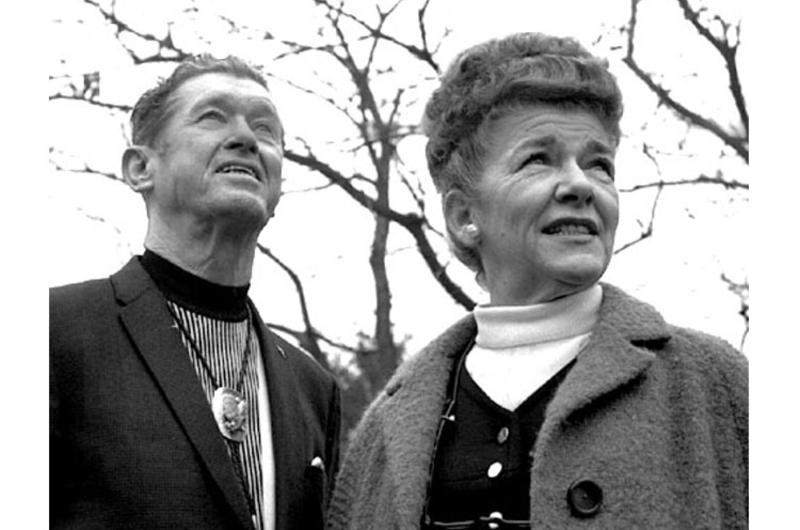

This website was created and maintained from May 2020 to May 2021 to commemorate the 75th anniversary of Stars and Stripes operations in the Pacific.
It will no longer be updated, but we encourage you to explore the site and view content we felt best illustrated Stars and Stripes' continued support of the Pacific theater since 1945.
Acuff on USO tour: East meets Western country music tycoon

Roy Acuff and his wife, Mildred, in Tokyo in December, 1969.
By Hal Drake | Stars and Stripes December 28, 1969
TOKYO — Was this a millionaire entertainer, music publisher and landowner? Where were the dark glasses, the Italian silk suit, the loose handshake and the flashy, backslapping demeanor?
"I haven't forgotten the way I was raised," said Roy Acuff. "I live the way I was raised to live."
Acuff told of how he learned to appreciate the simple life the hard way. There was his boyhood in Maynardville, Tenn., where neighbors were close, living was hard and a stranger was cautiously inspected before he became a friend. Acuff's father, a farmer and a Baptist missionary, fought a brutal, losing battle with a hillside patch of sassafras.
It was the day after Christmas and Acuff recalled the Christmases of decades long past.
"We weren't the poorest people but we were not successful farmers, either. I don't know how my daddy always managed to fill our stockings with candy and apples and give us that one toy, maybe a monkey on a stick. That's all and we were glad to get it."
Christmas was also Acuff's 33rd wedding anniversary. His wife, Mildred, sat near him in The Sanno in downtown Tokyo — far removed from the Nashville he first saw as he was struggling upward as a young performer.
It was just a rustic little Southern town then. Acuff saw Nashville bloom into a metropolis as it became the citadel of country and western music — much the same way Hollywood transformed from a lemon grove into the movie capital.
Acuff made Nashville so. He and Brother Oswald, Jimmy Riddle and the other Smoky Mountain Boys who have been faithful standbys for more than a quarter of a century — and Ray Price, Hank Snow, Carl Smith and a legion of others who became young, wealthy successes.
Acuff noted that a young performer can make his first million dollars in two or three years if he hits it big.
"Some of the boys have done it," he shrugged lightly. "It's easy for them now. I started in the depression years and my fortune didn't come in that easy. Gene Autry, Bob Wills and I were all recording at the same time and none of the money was fast or easy. You were good or you were out. If we didn't sell a quarter of a million or a half a million, they let us go."
Acuff did not bring a guitar, a fiddle or any other of the instruments he plays as an accomplished performer. Making a USO tour of military hospitals in Japan before moving on to the Philippines, Guam, Okinawa and Hawaii, Acuff stopped by bedsides, shook hands and gave out autographs. The 66-year-old entertainer-executive ("I think Bob Hope and I have the same birthdays") ran into a few men from Nashville and one graying Air Force sergeant who recalled Acuff's 1949 tour before military audiences, his first, in Germany.
Acuff said that country-western music "is no different from any other business." He recalled that Acuff-Rose, which he founded after singing "The Great Speckled Bird" on "Grand Ole Opry" in 1938 and rocketing to the top, was the first country-music publishing firm to actually set up in Nashville or anywhere in the South. His first records had been made in Chicago.
But before "Bird," "Wabash Cannonball" and other hits that sold as fast as dollars could pour over record store counters, there were lean years and hard times.
There were also the-years that rock 'n' roll bit deeply into country music record sales and gave it serious competition — but did not cut down on personal appearances that were flooded by fans for whom there was only one kind of music. Adding income from this to the money he makes as a publisher, landowner and proprietor of a museum of artifacts and antiques he has collected from all over the world, Acuff patiently waited until country and western music outlasted a very temporary intruder.
There have been times of tragedy and sadness, also — the .death of Jim Reeves, killed in a plane crash in 1964, as he was riding a wave of youthful success. A year earlier, Hawkshaw Hawkins, Cowboy Copas and Patsy Cline had died in another air crash.
Acuff has never forgotten his humble origins — the wellspring from which much of his music came.
"I don't wear dark glasses and drive a big car," he said. "I go back to Maynardville and see the people. We (he and his wife) don't party a lot. We live like we were raised to live ..."


